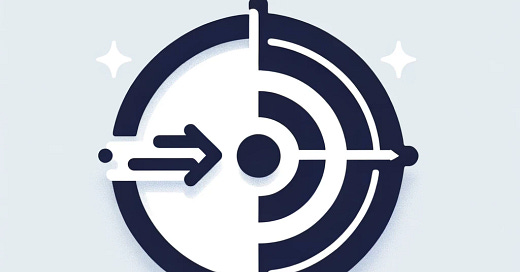Today, society urges us to do more, be better, and accomplish everything faster. The information deluge and escalating expectations in our personal and professional lives can often present us with two seemingly inevitable paths: paralysis from overwhelming demands or burnout from relentless striving.
In navigating this dichotomy, it becomes critical to ask whether we should prioritize effectiveness over efficiency.
Understanding Efficiency and Effectiveness:
While often used interchangeably, "efficiency" and "effectiveness" represent distinct ideas. Efficiency denotes the capacity to accomplish tasks right, optimizing outputs with the least expenditure of time and resources.
In contrast, effectiveness embodies doing the right things – completing tasks that bring about desired outcomes or move us closer to our goals. The key is fostering an environment that emphasizes effectiveness over efficiency.
Navigating the Path to Effectiveness:
Becoming more effective often requires a shift in our methods and thinking. Unlike efficiency, which prioritizes quick task completion with minimum resources, effectiveness demands focusing on the broader objective, which might involve calculated risks or an inefficient route. Welcome mistakes and risks, as they are stepping stones to personal and professional growth, enabling us to learn and adapt.
Focus on the Outcome, Not the Process:
Prioritizing effectiveness over efficiency necessitates concentrating on the result rather than merely the steps to reach it. We open ourselves to innovative solutions and methodologies while keeping the outcome in sight.
While efficiency concentrates on doing things right, effectiveness targets doing the right things. By choosing effectiveness over efficiency, we increase our ability to achieve more.
Moving Towards an Effective Future:
The primary obstacle to effectiveness often lies in our inefficiencies – wasted time, unnecessary efforts, or lack of discipline. Overcoming this involves small, gradual changes to our habits and routines, leading to considerable productivity boosts over time.
Stoic philosophers underlined the importance of self-reflection and mindful action, which translates to regularly reviewing our performance, learning from our errors, and continually seeking self-improvement in the professional realm.
Effective Work
To encourage employees to adopt a mindset focused on effectiveness, create a work environment that fosters the development of such a mindset and provides the tools and guidance they need to achieve desired outcomes. Here are some strategies to help employees think more effectively:
Set clear goals and expectations: Communicate the organization's objectives and ensure employees understand how their roles and tasks contribute to those goals. Align efforts toward achieving those objectives and prioritize the most critical tasks.
Foster a problem-solving culture: Encourage employees to approach challenges with a problem-solving mindset, focusing on finding solutions to achieve the desired outcome. Provide the necessary resources and support to tackle problems and think critically about the best ways to address them.
Encourage collaboration and knowledge sharing: Fostering a culture of collaboration and knowledge sharing can help employees learn from each other, exchange ideas, and develop more effective solutions. Encourage teamwork and create opportunities for employees to collaborate on projects and share their expertise.
Offer training and development opportunities: Provide employees with training and development programs that help them improve their skills, enhance their knowledge, and learn new ways of working effectively by including workshops, seminars, online courses, or mentorship programs.
Empower employees to make decisions: Giving employees the autonomy and authority to make decisions related to their work can encourage them to take more responsibility for their performance and to think about the most effective ways to achieve their goals.
Recognize and reward effectiveness: Acknowledge and reward employees who demonstrate effective thinking and achieve desired results with verbal praise, public recognition, or tangible rewards such as bonuses or promotions. Recognizing and rewarding effectiveness can motivate employees to continue striving for better results.
Encourage feedback and continuous improvement: Foster a culture where employees feel comfortable providing feedback and discussing areas for improvement. Encourage reflection on performance, identify areas for improvement, and work on implementing more effective strategies.
Lead by example: As a leader, demonstrate effective thinking and decision-making. Help set a positive example for employees to follow and reinforce the importance of effectiveness in achieving organizational goals.
The modern world often equates success with efficiency and productivity, but effectiveness and efficiency aren't synonymous. By prioritizing effectiveness – achieving desired outcomes and meeting our goals – over merely completing tasks quickly, we can navigate toward sustainable success in our personal and professional lives.



